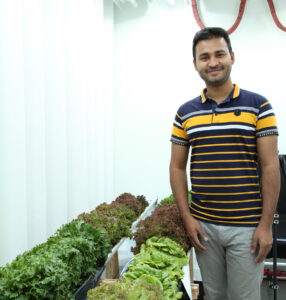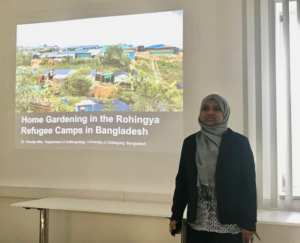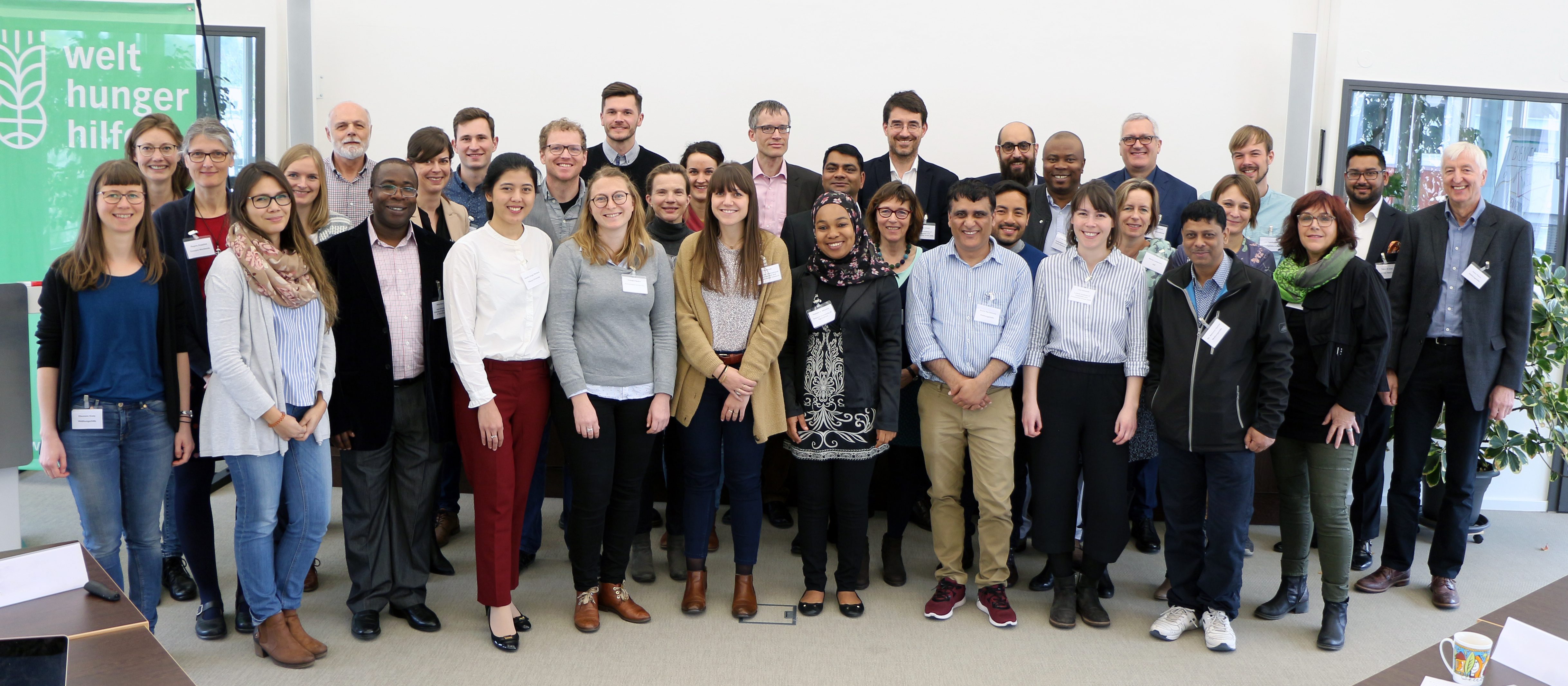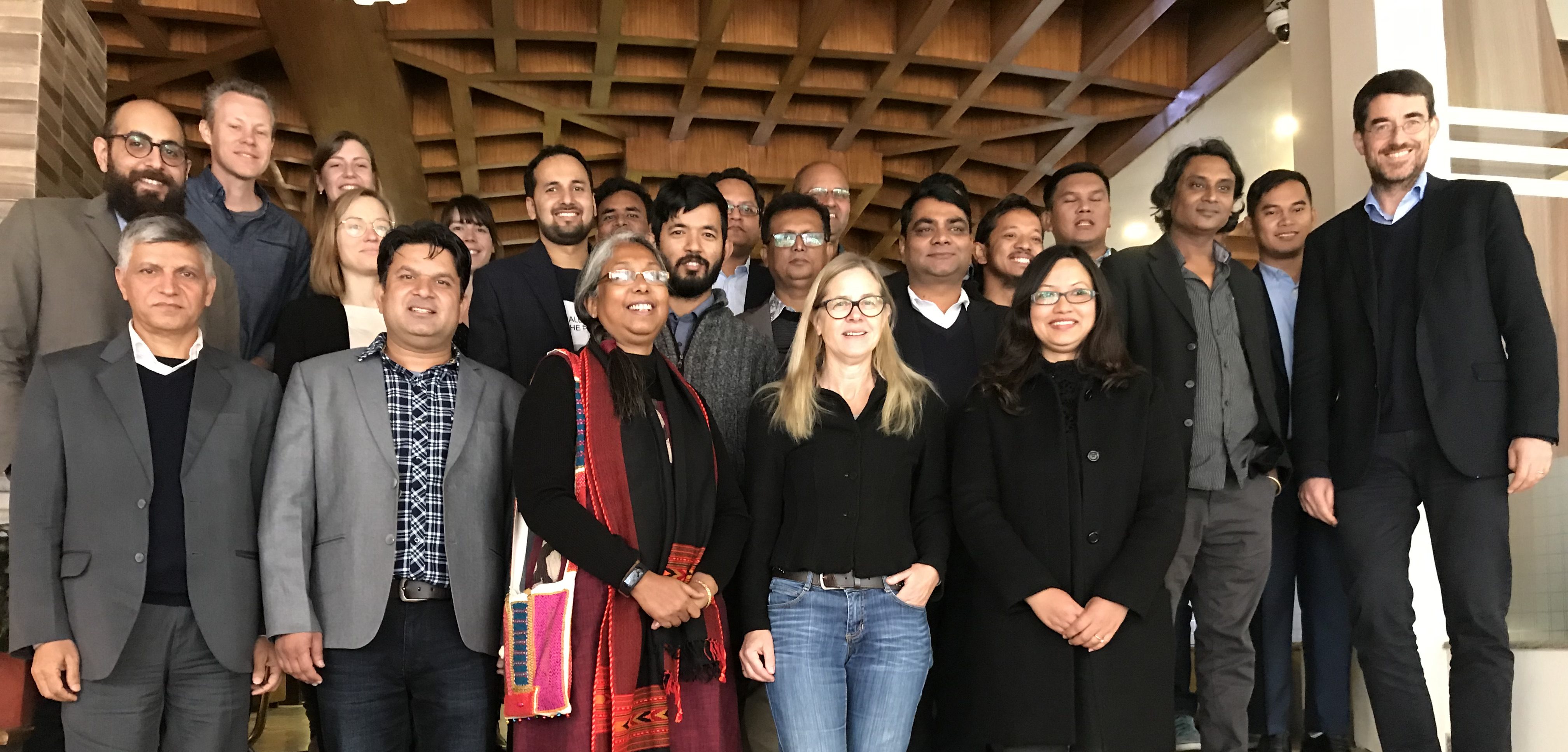HG4RR Webinar Series continues, every 3rd Tuesday, February – June 2021
We are excited to continue to the international dialog about home gardens in crisis settings with an expanded webinar series. We will be inviting several guest speakers in the coming months to join Professor Tilman Brück from the Leibniz Institute of Vegetable and Ornamental Crops, to talk about their work. The HG4RR webinar series is open to all! Click here to register.
Final Installment of HG4RR Webinar Series, 15 December: “Impact evaluation of complex agricultural interventions in humanitarian settings: The case of Syria”
We are excited to enrich the HG4RR network with a series of webinars focused on the challenges and opportunities of home garden intervention in development and crisis settings. Experts and researchers from around the world will speak about their work and participate in a discussion moderated by Professor Tilman Brück from the Leibniz Institute of Vegetable and Ornamental Crops, Germany. The HG4RR webinar series is open to all! Join us for the final installment: Click here to register.
HG4RR Workshop in Berlin Postponed
In light of the Sars-CoV-2 outbreak, we have decided to postpone the HG4RR workshop. Several participants are not allowed to travel which means it is not worth having a meeting. Instead, we plan to have the next meeting in April 2021 in Berlin. Our donor has already agreed to this change in plan.
We sincerely hope that you will be able to join us for the rescheduled workshop – all accepted papers remain accepted for the re-scheduled workshop, too. We will be in touch as soon as we finalize the new date and location.
We have come to this painful decision after a long deliberation and we thank you for your understanding. Please reach out if you have any questions.
HG4RR-IGZ research exchange programme
During his participation in HG4RR research exchange program, Dr. Jakaria Chowdhury Onik had an opportunity to work under the guidance of Dr. Oliver Korner at Leibniz Institute of Vegetable and Ornamental Crops (IGZ), in Berlin.They worked on implementing a short research project combining two traditional growing systems for vegetables and fish as it has been done in Asia for centuries, developing further high-tech technologies for home usage. The so-called aquaponics food production system combines aquaculture and crop production in a resource minimized way that produces high-quality and healthy foods. This work enabled me to go through the new ideas and possibilities in the context of Bangladesh. During his one-month stay, he had the opportunity to attend seminars and symposiums, and learned plenty of new research ideas and possible working points for future collaboration towards better livelihoods using next-generation horticultural systems. The future context of the research will expand our understanding of how informal small-scale integrated gardening with minimal land use can strengthen the food and nutritional security and resilience of vulnerable households.

About Dr. Jakaria Chowdhury Onik:
Dr. Onik is currently working as a research associate under the research project “Assessing future forest area changes and crop production practices in the Chittagong hill tracts areas in Bangladesh” at the Department of Agricultural Extension and Rural Development at Bangabandhu Sheikh Mujibur Rahman Agricultural University, Bangladesh. Dr. Onik earned his PhD in agro-products processing and utilization from the Chinese Academy of Agricultural Sciences in Beijing, China. He has expertise on horticultural production systems, molecular regulation of fruit and vegetable quality, as well as quantitative and qualitative methodologies in plant research.
Call for Papers – HG4RR Workshop in Berlin “Home Gardens as a Coping Strategy in Crises and Humanitarian Emergencies”
The 3rd HG4RR Network workshop will be held in Berlin at Humboldt University on 27-28 April 2020 in partnership with IGZ and ISDC. We are accepting papers for the workshop, titled “Home Gardens as a Coping Strategy in Crises and Humanitarian Emergencies”, until 15 January 2020. We encourage you to submit your research and extend the invitation to people in your wider networks. Funding to cover participant travel costs is limited, so please apply as soon as possible so we can begin visa and travel coordination. Qualifying rules and application deadlines can be found in the Call for Papers.
Please note that the email address for submission has changed. Please send your papers to hg4rr@isdc.org
Now Accepting Applications for the 2020 HG4RR Exchange Programme
12 December 2019
The call for applications for the research exchange programme is open now. The research stays can last up to two months, and you do not need to have published to apply for funding. We can now also host scholars from Africa! The deadline is 15 January 2020. Read more on the 2020 Exchange Programme.
Rohingya refugees: home gardens, food security, and agency.
HG4RR-ISDC research exchange programme strengthens ties between Bangladesh and Berlin
10 December 2019
Dr. Khadija Mitu, an associate professor of anthropology at the University of Chittagong in Bangladesh, spent November 2019 as a guest researcher at the Leibniz Institute for Vegetable and Ornamental Crops (IGZ) in Germany. Her research was hosted by the Home Gardens for Resilience and Recovery (HG4RR) network operating under IGZ and ISDC.
The HG4RR network is an interdisciplinary group of experts, researchers, and practitioners from Southeast Asia and Europe working to advance topics related to home gardens, resilience, and food security. The HG4RR network examines informal small-scale home gardens in the context of vulnerable households and communities living under extreme uncertainty. The network aims to better understand the effects of home gardens on material outcomes like access to food and on broader issues like livelihoods and women’s empowerment.
During her stay at IGZ, Dr. Mitu presented the findings of her qualitative research on the nutritional and social impacts of home gardening practices among the Rohingya refugees in Bangladesh. She found that home gardening not only helps alleviate food insecurity, but also improves psychosocial wellbeing and women’s agency and mobility in the refugee context. Working with the research team at the Economic Development and Food Security Research Group under the guidance of Prof. Dr. Tilman Brueck, Dr. Mitu developed a collaborative research proposal to more deeply explore these research outcomes through a mixed-methods longitudinal study.
Dr. Mitu described her research stay at IGZ and HG4RR as an important networking opportunity: “I have learned a lot working with Prof. Brueck and his wonderful team,” she said. “We had great discussions on research potentials, ideas for future collaborations, and ways for exploring our areas of research interests in relation to the role of home gardens for nutritional security of Rohingya refugees in Bangladesh.”
HG4RR recently announced a new call for funded research visits lasting between two weeks and two months at the IGZ located just outside of Berlin. The call is open to scholars from a variety of different disciplines and organizations who are interested in and/or working on projects related to agriculture, gardening, and food security in South or East Asia. The deadline for submission is 15 January 2020.

About Dr. Khadija Mitu: An associate professor of anthropology at the University of Chittagong in Bangladesh, Dr. Mitu earned her PhD in Science and Technology Studies (STS) from Rensselaer Polytechnic Institute, USA, and her master’s in applied anthropology from the University of South Florida, USA. Dr. Mitu has expertise in advanced qualitative research methods, development studies, migration studies, medical anthropology, gender studies, and assisted reproductive technologies.
Online survey on gardening interventions in humanitarian emergencies and conflict-affected settings
4 October 2019
We kindly invite you to take part in an online survey on “gardening interventions in humanitarian emergencies and conflict-affected settings”. The survey is administered by IGZ – The Leibniz Institute of Vegetable and Ornamental Crops as part of the Home Gardens for Resilience and Recovery Network (HG4RR).
The survey will inform a research study which aims to learn about current practices in small-scale garden interventions in difficult environments (e.g., violent conflict, climatic disasters), which are implemented by International and local development organisations. Additionally, the study will identify what works and what does not, as well as what learning and evidence gaps need to be addressed in the future.
If you or your organisation work on such programmes or interventions, we would appreciate if you can take 10-15 minutes of your valuable time for participating in this survey, which can be accessed via the following link
https://www.surveymonkey.de/r/9NNYLZM
The deadline for submitting your answers is October 31, 2019.
Exchange Programme for Researchers Focusing on Home Gardens for Recovery and Resilience
16 April 2019
The HG4RR-Network intends to enrich the exchange between countries, disciplines and pools of experience and it therefore bringing different experts together in Germany for short-term research visits. The application deadline is 10 May 2019. For more details click here.
Workshop on Home Gardens as a Coping Strategy in Crises and Humanitarian Emergencies
8 April 2019
The international Workshop “Home Gardens as a Coping Strategy in Crises and Humanitarian Emergencies” successfully took place on the 2-3 April 2019 at the Welthungerhilfe headquarter offices in Bonn Germany. The workshop was organized by the Leibniz Institute of Vegetable and Ornamental Crops (IGZ), led by Professor Tilman Brück, as well as Professor Martin Petrick, from University of Giessen and Dr. Heinz Peters from the Welthungerhilfe. The workshop was integrated with the HG4RR (Home Gardens for Resilience and Recovery) second network meeting, which allowed to gather expertise of researchers and practitioners in this network into the workshop. In total there we more than 35 experts from more than 10 countries from Europe, Asia, and Africa.

The overall objective of the workshop is to advance our knowledge of home and school gardens, resilience, food security, and related interventions. More specifically, the workshop gathered researchers and practitioners working on the topics of home gardens in emergencies to deepen our understanding of how informal small-scale home gardening acts as a coping strategy to strengthen the food and nutritional security and resilience of vulnerable households living under extreme uncertainty. In addition, the workshop expanded our knowledge more about how home and school gardens may have positive effects beyond their immediate outcomes (food security and nutrition), such as on women empowerment. For more details see the agenda.
Call for Papers: Home Gardens as a Coping Strategy in Crises and Humanitarian Emergencies
1 February 2019
The Leibniz Institute of Vegetable and Ornamental Crops (IGZ), the Leibniz Institute of Agricultural Development in Transition Economies (IAMO), and Welthungerhilfe invite researchers to submit original research papers for presentation at an international and interdisciplinary workshop on “Home Gardens as a Coping Strategy in Crises and Humanitarian Emergencies”. The two-day workshop will be hosted at the office of Welthungerhilfe in Bonn, Germany, and will precede the second Home Gardens for Resilience and Recovery (HG4RR) Network meeting on 4 April 2019. Please see the call here.
HG4RR Kick-off Workshop in Kathmandu, Nepal: Lessons from Home and School Garden Interventions in Asia to Support Livelihoods and Food Security
20 December 2018
The Kick-off Workshop “Lessons from Home and School Garden Interventions in Asia to Support Livelihoods and Food Security” successfully took place on the 13-14 December 2018 in Kathmandu, Nepal. The main objective of HG4RR is to establish an international network of experts of researchers and practitioners to advance our knowledge on topics related to home gardens, resilience, food security, and interventions. In addition to facilitating research exchange and building capacity, the project aims to study how informal small-scale home gardening acts as a coping strategy tool to strengthen the food security and resilience for vulnerable households living under extreme uncertainty and susceptible to negative external shocks. In addition, home gardens have positive effects beyond their immediate outcomes (food security and nutrition), such as on, women empowerment. The HG4RR network is formed of partners from 6 countries (Bangladesh, Cambodia, Germany, Philippines, Nepal, Thailand, India).

The workshop on Day 1 allowed experts from governments, donors, and NGOs as well as researchers to share experiences and lessons learnt about home and school gardens as successful interventions for strengthening livelihoods, gender equality and food security. A particular focus was on post-emergency settings though all case studies. The workshop on Day 2 was by invitation only and allowed members to plan future activities for the HG4RR Network. See the agenda for further details.


